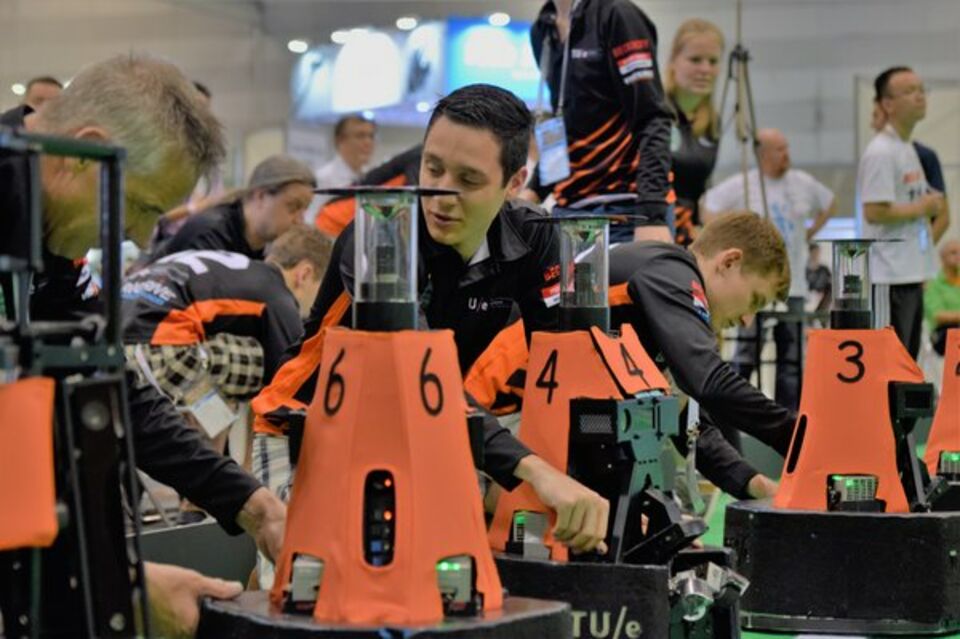Robot ‘Orange’ has a good shot at the robot soccer world title
The real World Cup has to do without ‘Orange’, but not the robot soccer World Cup (RoboCup). The team of TU Eindhoven (Tech United), playing in orange, hopes to reach the final for the eleventh time in a row. The playing fields are more than 40 percent larger this year, in order to give attacking soccer more opportunities. That plays into the hands of the Dutch robots, but there is also a catch: the goals are getting 20 percent wider. The RoboCup takes place in Montreal (Canada) from 18 to 22 June.
In recent years, the main competitors in the Middle Size League of the RoboCup have concentrated on a kind of catennacio style of soccer, says the Eindhoven team captain Wouter Kuijpers. “Certainly the Chinese and the Portuguese can kill almost anything dead defending a square meter. With 2 teams of 5 robots on less than a hundred square meters, the field was actually too full. As a result, soccer became a bit of a chess game, often with boring matches.”
Certainly more goals
The RoboCup federation now also recognizes this and therefore decided to increase the fields by more than 40 percent, to 22x14 meters. Kuijpers expects that “this will give the robots more space to play soccer, to pass, to combine and to create opportunities.” His robots are very accurate, as can be seen in this demo of last month: https://twitter.com/lievenscheire/status/997902513629286402
However, there is also one but. The goals will be almost half a meter wider, and the defense is traditionally not the strongest side of the Eindhoven game. The Eindhoven goalkeeper will probably have a bit more to do. So there will certainly be more goals, but it is yet to be seen whether they will mainly be ‘in the opponent’s net’.
Society
The RoboCup is the World Cup for self-steering robots, i.e. robots that are not controlled directly by humans. The RoboCup Federation regularly updates the rules, with the aim of forcing the teams to innovate further. The underlying aim of the RoboCup is to stimulate the development of reliable and affordable self-steering (autonomous) robots that benefit society. As a dot on the horizon, RoboCup has therefore set itself the target of having soccer robots by 2050 able to defeat their human soccer world champion counterparts.
What is crucial here is that the robot is able to deal with uncertainty and new situations, something in which soccer robots are at the forefront. TU Eindhoven recently began a major project to transfer its many years of knowledge and expertise to the industry.
App with the robot
Another branch of robot sport in which TU Eindhoven will compete for the RoboCup is the @Home League. That is the category of home-help robots, also called service robots. Robots are being developed that can, among other things, help older people to live independently at home for longer. The Eindhoven team invariably ends up at the top with its robot AMIGO, but the highest final position so far has been silver. In addition, AMIGO’s successor SERGIO is being primed to take over completely next year.
A new element this year is that people can give orders to the Eindhoven care robots via Whatsapp, a novelty that will certainly earn points.
The RoboCup, with about 4,000 participants from around 35 countries, takes place every year in a different metropolis and this year Montreal is the venue.
From Monday until Wednesday (18-20 June) there is a round robin stage. The semi-finals and finals are on Thursday 21 June. The soccer robots final starts on Thursday at 8:30 p.m. Dutch time (CET). The soccer matches consist of 2 halves of a quarter of an hour each.
Robot soccer talk show
The matches of the Eindhoven team can be followed live via robocup.live and will be provided with match commentary. Furthermore, on robocup.live there will be a daily live ‘soccer show’ from the RoboCup, hosted by famous Flemish and ‘TV-nerd’ Lieven Scheire. Cursor interviewed him on his close relationship with Tech United.


Discussion